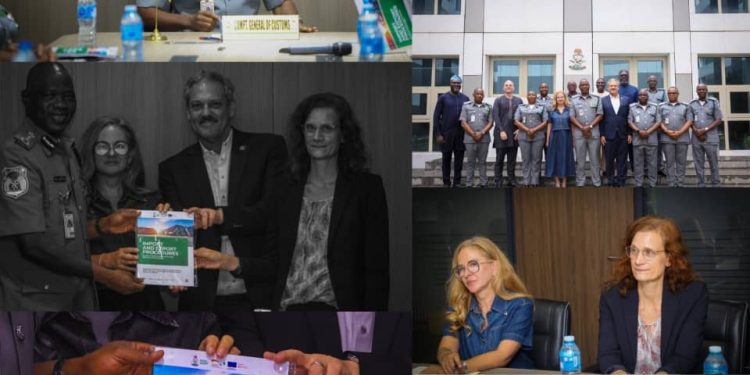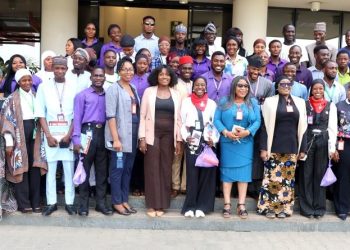By Nkechi Eze
In a landmark stride toward supporting Nigeria’s energy transition ambitions, the Nigeria Customs Service (NCS) has unveiled a comprehensive Handbook on Import and Export Procedures for Renewable Energy Equipment, aimed at simplifying Customs processes, boosting trade transparency, and driving compliance in the fast-growing renewable energy sector.
The official launch ceremony, held on Monday, 29 July 2025, at the NCS Headquarters in Abuja, brought together high-level representatives from the European Union (EU), the German Embassy, and the Deutsche Gesellschaft für Internationale Zusammenarbeit (GIZ). the key partners behind the initiative. The collaborative effort reflects Nigeria’s alignment with global sustainability goals while strengthening institutional reforms across border operations.
Speaking at the event, the Comptroller-General of Customs (CGC), Bashir Adewale Adeniyi, described the new handbook as a “living document” that will continue to evolve alongside advances in technology, global trade protocols, and government policies.
“With Nigeria’s increasing investment in renewable energy infrastructure, Customs has a responsibility to ensure that legitimate trade in this sector is facilitated efficiently and securely,” he said. “This handbook addresses past classification and clearance challenges, offering clarity to importers, exporters, and officers alike.”
Adeniyi further noted that the initiative aligns with the Federal Government’s Energy Transition Plan (ETP), which targets net-zero emissions by 2060 and aims to expand energy access for millions of Nigerians. He emphasized that Customs, as a gateway agency, must play a frontline role in making the clean energy economy accessible and attractive to investors.
“This is more than a Customs document; it’s a strategic tool for economic transformation,” he declared. “It supports our commitment to reforms that foster transparency, stimulate investment, and serve Nigeria’s broader development priorities.”
The CGC also acknowledged the technical and financial support of international development partners, calling the partnership with the EU, German government, and GIZ “a model of institutional synergy that benefits both trade and the environment.”
In her remarks, Inga Stefanowicz, Head of the Green and Digital Economy at the EU Delegation to Nigeria, praised the Nigeria Customs Service for embracing reforms that promote sustainability, inclusiveness, and compliance.
“We are proud to support this handbook as part of our broader partnership with Nigeria on sustainable trade and circular economy goals,” she said. “We are especially encouraged by the rising involvement of women in the Nigeria Customs Service, a sign of inclusiveness that strengthens institutional resilience.”
Also speaking at the event, Karin Jansen, Head of Cooperation at the German Embassy in Nigeria, reiterated Germany’s strong interest in expanding its bilateral cooperation with Nigeria, particularly in the area of green energy development and trade facilitation.
“Germany remains committed to supporting Nigeria in building a clean, modern, and inclusive economy,” she said, noting that the handbook would serve as a practical tool to unlock trade bottlenecks and encourage climate-smart investments.
Marcus Wagner, Country Director of GIZ Nigeria and ECOWAS, commended CGC Adeniyi for his visionary leadership and recent election as Chairperson of the World Customs Organisation (WCO) Council.
“That appointment is not only a personal achievement but a global recognition of Nigeria’s growing leadership in Customs modernisation and reform,” he said.
The new handbook provides detailed guidance for Customs officers, freight forwarders, renewable energy companies, and other stakeholders on documentation, tariff classification, exemptions, valuation, and import-export procedures for solar panels, wind turbines, batteries, inverters, and other green energy components. It is expected to promote faster clearances, reduce compliance risks, and support the creation of a sustainable logistics ecosystem in Nigeria.
The initiative also aligns with broader multilateral commitments under the Paris Agreement and the African Continental Free Trade Area (AfCFTA), positioning Nigeria as a regional hub for clean energy trade and green industrialisation.
As the global community moves decisively towards de-carbonization, the launch of this renewable energy handbook signals Nigeria Customs’ readiness to not only regulate but also enable the flow of innovation, investment, and impact across borders, ushering in a new era of Customs-led climate action.

















